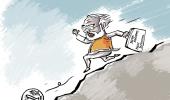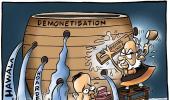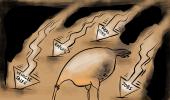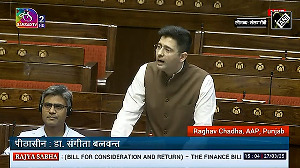India has too many small companies and this is inefficient.
It should instead have only a handful of very large players running its economy and these giants can then compete with the world, observes Aakar Patel.

The head of the NITI Aayog said something that upset many people and so he had to explain himself.
This was, of course, his statement, repeated twice, that India had too much democracy.
However something else was said in the same speech that did not get as much attention though, in my opinion, it is far more important and concerning.
The fact checking Web site altnews.in analysed the video recording of his speech and confirmed that he had indeed used the words he denied using. It reported: 'In India we are too much of a democracy so we keep supporting everybody.'
He went on to elaborate, 'For the first time in India a government has thought big in terms of size and scale and said we want to produce global champions. Nobody had the political will and the courage to say that we want to support five companies who want to be global champions. Everyone used to say I want to support everyone in India, I want to get votes from everyone.'
That second bit is the thing that got ignored.
The head of NITI Aayog, which is the prime minister's think-tank, was explaining the strategy of the Modi government on the economy.
It has not been articulated as clearly as it was in the statement above, but has been expressed in policy quite clearly.
In brief, the theory is that India has too many small companies and this is inefficient.
It should instead have only a handful of very large players running its economy and these giants can then compete with the world.
So what will the government do to make this possible? It will try and make it difficult for the small and medium size industrialists to compete.
This is also called 'formalisation'.
It assumes that the small and medium sized entities in business are all tax thieves.
They cheat the government by operating in cash. To make their existence difficult if not impossible, the first step is to remove cash from the economy.
This was done on Tuesday, November 8, 2016. Businesses that depended on cash transactions, even if they were legitimate ones, were not able to operate for weeks and were hampered for months.
The large businesses were not affected because they could do with electronic transfers just as the upper class in the metro areas managed with their credit cards.
The second stroke against the small and medium was the Goods and Services Tax which was made so complicated as to require large teams of people in-house for compliance.
The repeated and frequent filing of returns and the managing of the digital system meant that once again a large number of people exited from businesses that became unviable because of added cost or simply because people could not cope with the complications and chose to do something else.
Who benefited from the exit of the small and medium was again the large.
The third stroke was the lockdown of this year which broke the back of the small and medium, who had neither the cash reserves to be able to deal with such a blow or the ability to get staff to 'work from home'.
The Economist, the most respected global magazine, reported that the net worth of Mukesh Ambani had gone up by 350% since November 2016.
The net worth of Gautam Adani has gone up by 750% in the same period.
And all this happened in an economy that has been in decline.
This month, December, is the 36th straight month that India's economic growth has been slowing down.
The collapse began in January 2018 according to government data and has continued for three years.
The finance ministry's chief economic advisor asked that a survey that the Modi government had refused to release be released finally.
What did it show? It showed that Indians were spending less money in 2018 than they had been in 2012.
Meaning that they were earning less also. Not all Indians, of course: some were making much more precisely because of the fact that the others were making less.
Everything that seems to many to be puzzling about the Modi government's economic policy makes sense after we consider what it is deliberately doing to this nation.
Modi's former advisor and enthusiast Arvind Panagariya complained about Atmanirbhar, saying it was merely import substitution and had failed before.
What does that mean? It means that Modi has applied tariffs on imported things that Indians buy, like television sets and mobile phones, so that local industrialists can sell their goods at a higher price than the imported ones.
Atmanirbhar privileges the industrialist over the consumer but that is not the way that it is advertised.
Who does the policy seek to make Atmanirbhar? It is not the consumer or the citizen.
It is those selected favourites of the government who have been tasked with winning while the rest of us are made deliberately to fail.
Aakar Patel is a columnist and writer.
You can read Aakar's columns here.
Feature Presentation: Aslam Hunani/Rediff.com











 © 2025
© 2025